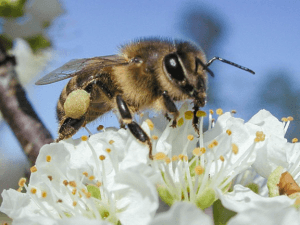A declining bee population could have a negative impact on countries grappling with malnutrition.
A recent study conducted by Rebecca Chaplin-Kramer, a landscape ecologist at Stanford University, examined the link between pollinators (mainly bees) and global health through the lens of nutrition. Chaplin-Kramer, along with a group consisting of pollination biologists, spatial scientists, and nutritionists, set out to investigate the significance of pollinators to global health by discovering the regions most dependent on pollinator-dependent, nutrient-rich crops.
To most, a connection between pollinators and essential nutrients would seem self-evident, for pollinators fertilize crops that humans eat (1). It should be noted that pollinators only fertilize a small proportion (roughly five to ten percent) of the food crop. Corn, for example, is mainly pollinated by wind, not by pollinators like bees. However, the crops that are in fact accounted for by these pollinators are needed to supply malnourished areas with certain vital nutrients. Thus, the impact of pollinators is more complex than expected.
In order to investigate the importance of this complexity, Chaplin-Kramer and her team gathered information on the agriculture yields, pollination reliance, and nutritional value of more than 100 of the “most common crops grown globally for food” (2). They also utilized data from both the United States Department of Agriculture and from previous research conducted. With this information, they compiled maps containing “hotspots that are most reliant on pollinators for the production of three essential nutrients – vitamin A, iron, and folate” (2). A severe lack of these nutrients can lead to loss of vision, pregnancy complications, problems with development, and higher mortality rates (2).
The team was then able to report several findings based on this data. First, they concluded that the more developed areas of the world such as China, Japan, Europe, and the United States depend on these pollinators for economic stability. In contrast, India, sub-Saharan Africa, South Asia and other developing regions need them for health purposes, as these crops provide essential nutrients. Second, they concluded that, based on information from the World Health Organization, deficiencies of iron and vitamin A were “three times more likely to occur in areas where nutrient production was most dependent upon pollinators” (2).
Chaplin-Kramer notes that this study does not seek to establish a causal relationship, but rather serves to highlight an important correlation. It is meant to be a step away from past research that has focused more on the economic conditions stemming from a declining bee population. Finally, Chaplin-Kramer asserts that “This is not a doomsday scenario, it’s a call to action”. Actions suggested by the team of scientists include increasing use of crops with high nutrient content but low dependence on pollinators, increasing importation of crops with the needed nutrients, and managing bee colonies more effectively to control pollination.
Sources:
Pollinator Partnership. (1996). Pollinators. Retrieved October 12, 2014.
Balmer, J. (n.d.). Decline of bees and other pollinators could worsen global malnutrition. Science/AAAS | News – Up to the minute news and features from Science. Retrieved October 13, 2014, from http://news.sciencemag.org/


Leave a Reply